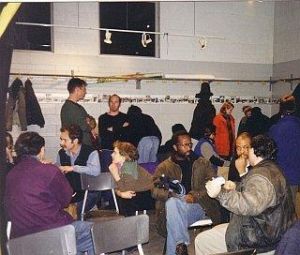
Centre For Local Research into Public Space (CELOS)

CELOS Regulatory Research Database
February 2013
These notes are from the first prototype database that has since been replaced by publiccommons.ca
Go straight to the database: publiccommons.ca.
June 2010
Toronto has a new community resource, the CELOS Regulatory Research Database.
After years of accumulation of data on parks and public spaces, CELOS has embarked on a program to establish key parts of this data in a format that is as readily accessible to the public as possible: this is the Regulatory Research Database [now the public commons database]. The database sets the stage for collaboration with others. It's a shared resource.
Here are the basic features of the database, looked at from the perspective of both content and form.
The ContentThe Regulatory Research Database contains five main tables of information
Each table is able to take any number of records relating to these topics. The records can contain historical data, reference material, summaries or overviews of issues that arise. Each record can be brief, or can hold multiple pages of information. As a research database, CELOS hopes that this will help everyone involved:
Try it! Go to the database. |
The TechnologyThe Regulatory Research Database is built on open source software. It rests on a classic LAMP stack (Linux, Apache server, MySQL database, and PHP5 programming language). It adds to this the Kohana application framework, and the popular jQuery javascript toolkit. Finally this website's webmaster (Henrik Bechmann) has contributed substantial amounts of original source code (the Bechmann library, and the SimpleWiki wiki parser/emitter) focussed on the specific requirements of database and content management. The result is a package which is being assembled into an open source software bundle the developer calls MusterDB. The software supports in a fairly generic way presentation of complex 1:M (one-to-many) synchronized recordsets, and a modern tagging system (see "Files" in the database) for ease and flexibility of classification and rapid filtering. The software has a relatively small footprint, and is written to be robust, maintainable, and scalable. The database could easily manage thousands, even tens of thousands of records right now, and with a little tweaking could handle much more if called upon. |



 Show search options
Show search options




 You are on the [cover page] of folder [Regulatory Research Database]
You are on the [cover page] of folder [Regulatory Research Database]